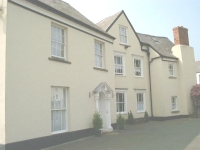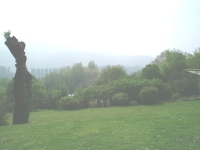
BAKER
| Outline Life | Allanson's Life | Manuscripts | EBCH | |
 |
Dom David
AUGUSTINE BAKER That Mysterious Man |
LAWYER, MONK, HISTORIAN, MYSTIC
1575-1641
Author of Sancta Sophia or
Holy Wisdom
M A I N D A T E S
 Baker family house, Abergavenny |
 View from the family home |
It is helpful first to be clear about the pattern of his life. His parents were what are known as church-papists, as were many of the survivors of Queen Mary's time. They were so named because although they outwardly conformed, they remained Catholic at heart, and often returned to full practice if a chance arose. He was born as David Baker 9 December 1575 in Abergavenny (since 1858 a Benedictine parish: but people in his childhood would easily remember their parish church when it was the priory church of Benedictine monks).
Baker's father was a lawyer, and young David was trained for the law, and was a very highly thought of in his early practice. He was at Christ's Hospital, then in London, and at Oxford by 1590. He studied law, first with his father and then in the Inner Temple: in 1598 he was made Recorder of Abergavenny. He had by now become almost an atheist, and as morally casual as any of his generation.
But at twenty-five he had what seemed to him a miraculous escape from death when crossing a dangerous bridge, and promised that if there were a Being who could rescue him from this peril he would devote his life to seeking him. He did; so he did. Beginning to suspect that Catholicism held the key, he was received in 1603, and while in London met and assisted with his legal knowledge some of the monks from Italy, including Fr Thomas Preston (who met and looked after Buckley in 1603): with Preston he went to Italy, where Preston had become a monk, and Baker was clothed as a novice in the Abbey of St Justina in Padua on 27 May 1605, Whitsun eve and the day after St Augustine of Canterbury's feast.
Ill health affected him all his life, so that he was able to say that in the end he perceived it as a gift and an advantage, since it prevented him from being involved in active ministry, practical affairs or constant distraction. It meant that he could not finish his novitiate, but was sent back home, which enabled him to supervise his father's return to the faith before he died. He made his profession somewhere in London, but as a monk of the Cassinese (Italian) congregation, not Buckley's: it was before the great link-up was made. Baker was however one of the first to join the renewed English group, and when later there were allocated to particular houses, Baker opted for St Laurence's. effectively, you chose between St Gregory's and St Laurence's: at that time there was no other community.
Instead of going to Dieulouard, however, he retired to a quiet house mission at Cook Hill, Worcestershire, but this was not a success so he returned to London and lived a rather withdrawn life so as to find his way into prayer, but at the same time he made himself useful to those in need of legal help, and the better-off clients enabled him to live. At some point not known, but probably in 1613, he went to Rheims and was there ordained priest. Thus he differed somewhat from the beginning from the other monks in England, since they were priests sent to the Mission as a sort of concession, whereas he initially was trying to be a monk-prayer. His view of things differed from the start: or he is evidence that there was a tradition very early in our history other than the purely missionary.
After a visit to Abergavenny to see his family and settle property, he returned to London, lodging in Grays Inn Lane, a lawyers' district and having many Catholics. It was at this time that he was asked to do much research in archives and libraries to assemble material later used in the book Apostolatus Benedictinorum in Anglia (1625). Though others contributed and his name is not on the title-page, the Bodleian library in Oxford lists David Baker as the author. The general thrust of this work was the large part played by the monks in the original conversion of England.
In 1624 there was an anti-Catholic outburst (when the projected marriage of Prince Charles to the Infanta of Spain collapsed in the last year of James I's reign). Many missioners left England for a time, among them Baker, and while he was at Douai he was asked to go and help to teach the nuns at the new convent just started at Cambrai, which is now Stanbrook. He was there for nine years, and this was the most fruitful period of his life, not only in benefit to nuns (and monks) but also in the production of written guidance for others. His own prayer life at this time was not on a very high level, or at least not taking a lot of his time, and writing about it may have been in part a substitute spiritual activity. It was certainly rich in effect.
However, Baker was no exception to the rule that, if you do something good in
the church, there will shortly come along someone giving good and holy reasons
why things should not be done thus, and there were complaints, certainly to some
extent the product of unhappiness at many nuns gathering round one director
rather than another: the problem is a perennial one in all communities. After
much searching, learned men pronounced his doctrine orthodox, but for peace he
was asked to return to Douai. Here something similar happened, but after about
five years Baker was indiscreet in allowing his annoyance at others' criticisms
to overflow into barely concealed polemics, and the President had little choice
but to move him. He was sent to London again, although he was not well. This was
considered at the time a bit harsh, but everyone was impressed with his
obedience in simply going and settling down to a few years of rather harassed
recusant life in central London. On one occasion passers- by stopped the
pursuivants arresting him in a house where he was, asking them what they
would have there, in a house where nobody did live nor durst (the plague being
suspected of having been lately in the house) but one poor woman, who was at
that time gone abroad [Prichard 284] He died on 9 August 1641, and was
buried in the churchyard of St Andrew's, Holborn. (Presumably he now lies
somewhere under Holborn Viaduct)
Abbot Justin McCann, Master of St Benet's Hall 1921-47, and titular Abbot of
Westminster from 1947, remains the principal expert on Baker, with the
uncontested claim that he is the only man since Fr Cressy to have read all two
million words of Baker, whose writings are very diffuse, repetitive and largely
free of organisation. Some have been published in modern editions, but for the
most part we are all dependent on the work of Fr Serenus Cressy, a convert monk
of St Gregory's (1605-74) - he was once a Canon of Windsor - who produced the
book Sancta Sophia.
This is for most people the beginning and end of Baker. It is a digest of matter from nearly all Baker's treatises, following an orderly and comprehensible pattern. Even so, the book is long and diffuse by modern standards: perhaps one should dip rather than attempt to read right through. It is moderately easy to find second-hand copies of Fr Gerard Sitwell's editions of 1964-72. But the effort is worthwhile, for (allowing for a certain seventeenth century quality) there emerges much of the spirituality and common sense which has underpinned the English monks and nuns since Baker's time. If we remember that his ideas were first formed at the same time as our Congregation was being re-formed (he was clothed in 1605), one can see how remarks about the dangers of too much supervision in religion, or control by superiors, throw light on the reasons which led young men to leave the Jesuit-run seminaries and seek another form of Christian life in the monasteries of Italy and Spain.
Those who are moved most by the call to missionary life and an active
apostolate have been less drawn to Baker, but often they show signs, especially
in later years, of having been formed under his influence: this was particularly
true of those whose novitiates were made at Belmont (1859-1919), and so it is
still true today, for they formed us. And because the approach which Baker shows
us is rooted in an older English tradition, that of Walter Hilton, the Cloud
(both worked on or editied by Baker and Cressy), Julian of Norwich &c.,
there is about this English spirituality something special, and an extra gift in
the Church, enriching traditions which have grown elsewhere.